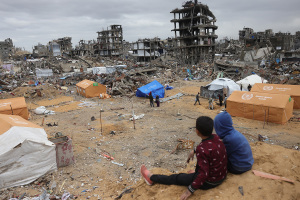50 Afghan evacuees brought to US had 'potentially significant security concerns:' Defense Dept. report

A report from the U.S. Department of Defense’s Inspector General raises questions about the security threats posed by dozens of Afghan evacuees brought to the United States following the withdrawal of U.S. troops from the Central Asian country last year.
The report, released Tuesday, provided an “Evaluation of the Screening of Displaced Persons from Afghanistan.” As noted by Acting Assistant Inspector General Andre Brown, the purpose of the evaluation is to “determine the extent to which the DoD managed and tracked displaced persons from Afghanistan through the biometric enrollment, screening, and vetting process.”
President Joe Biden helped ensure the arrival of “displaced persons from Afghanistan” in the U.S. by initiating “an inter-agency effort to evacuate and relocate Afghans who had applied for a Special Immigrant Visa (SIV) along with other vulnerable Afghans to address the rapid takeover of Afghan cities by the Taliban.”
Upon arrival in the U.S., Afghan evacuees were placed at “safe havens,” primarily consisting of military bases that allowed federal agencies to determine whether they posed a national security threat.
The report concluded that “U.S. agencies did not use all available data when vetting Afghan evacuees,” stating that “Afghan evacuees were not vetted by the National Counter-Terrorism Center [NCTC] using all DoD data prior to arriving in [the continental United States].”
“This occurred because Customs and Border Patrol [CBP] enrollments were compared against the Department of Homeland Security [DHS] Automated Biometric Identification System [IDENT] data,” the report stated.
This “data did not initially include all biometric data located in the DoD Automated Biometric Identification System [ABIS] database and because the DoD’s National Ground Intelligence Center [NGIC] has agreements with foreign partners that prohibits the sharing of some ABIS data with U.S. agencies outside of the DoD,” the report added.
While “NGIC personnel expanded their normal analytic review of all biometric watchlist matches to also include non-watchlist matches of Afghan evacuees,” the agreement between the NGIC and the Department of Homeland Security that enabled them to do so expired on Dec. 27. The agreement was ultimately renewed, and it will remain in effect until June 27.
Based on the results of the review thus far, the “NGIC personnel identified Afghans with derogatory information from the DoD ABIS database who were already in the United States.”
“As of November 2, 2021, NGIC had identified 50 Afghan personnel in the United States with information in DoD records that would indicate potentially significant security concerns,” the report stated.
However, government officials could not locate every Afghan evacuee with “derogatory information” on their records because of “field representatives or operators failing to upload data or maintain devices properly.” The NGIC had identified 31 Afghans with “derogatory information” present in the U.S. as of Sept. 17 but were only able to locate three of them.
“As a result of the NCTC not vetting Afghan evacuees against all available data, the United States faces potential security risks if individuals with derogatory information are allowed to stay in the country,” the report warned. “In addition, the U.S. Government could mistakenly grant SIV or parolee status to ineligible Afghan evacuees with derogatory information gathered from the DoD ABIS database.”
Security concerns are exacerbated by the fact that “Afghan parolees have the right to leave the safe havens at any time after receiving the required vaccinations and tuberculosis testing.”
Those seeking immigration parole status are separate from those seeking special immigrant visas after working on behalf of the U.S. government in Afghanistan by working on a military base or serving as an interpreter or translator.
Although “parolees must provide their address to [U.S. Citizenship and Immigration Services] and notify USCIS of every change of address” in order to obtain parolee status, many Afghan evacuees chose to leave the safe havens before completing the immigration process required to secure a two-year stay in the U.S. for “urgent humanitarian reasons.”
Reuters previously reported that more than 700 Afghan evacuees had left the “safe havens” before completing the resettlement process as of early October.
Regardless of whether Afghan evacuees have known terrorist connections, crimes committed by Afghans brought to the U.S. have caused some elected officials at the state level to call on the Biden administration to halt the refugee program.
In Montana, for example, the identification of a rape suspect as a 19-year-old Afghan evacuee caused Gov. Greg Gianforte to ask the Biden administration to conduct a “careful, immediate reevaluation” of the refugee resettlement program, citing “issues with your vetting system.”
Gianforte lamented that what happened in Montana was one of several “tragic events over the last few weeks” involving Afghan evacuees.
Just weeks before, two Afghan evacuees were charged with committing crimes while staying at Fort McCoy in Wisconsin, one of the “safe havens” mentioned in the Inspector General’s report. A grand jury indicted one of the men for attempting to have sex with a minor and engaging in sex acts with a minor while the other man allegedly strangled and suffocated his wife.
Ryan Foley is a reporter for The Christian Post. He can be reached at: ryan.foley@christianpost.com



























